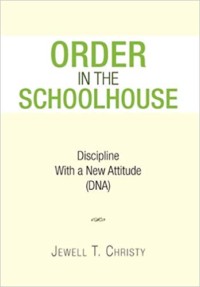Title: Order in the Schoolhouse
Subtitle: Discipline with a New Attitude (DNA)
Author: Jewell T. Christy
Publisher: XlibrisUS
ISBN: 978-1-4535-6248-2
Genre: Non-Fiction, Educational
Pages: 60
Reviewed by: Beth Adams
Pacific Book Review
Hillary Rodham Clinton is noted for her comment in her book It Takes a Village that it is necessary for far more than just parental influence in order to raise a child. Teachers, spiritual leaders, law enforcement, judges, society personalities and more are all necessary for input to produce the fully-formed development of a child; in order to become a successful contributor to our society. Dr. Jewell T. Christy expands on this with a narrower focus on the educational system, including primarily the teachers and school administrators, all becoming a team for educating students in her book titled Order in the Schoolhouse: Discipline with a New Attitude (DNA).
Within her chapters depicting each of the groups within the hierarchy of the educational system, Dr. Christy uses many examples, or case studies, to illustrate scenarios of interaction between students and teachers along with an analysis of how the principal or disciplinary actions were used to handle each situation. In many cases, criticism fell upon the school board, superintendents, principals and teachers, for not realizing the special needs of certain students or being too quick to judgement. Parents are brought into the disciplinary actions; but in some cases, by that time it had swelled larger than it was necessary – if the proper amount of discipline or diffusing the situation was corrected at the beginning. Of course, responsibility rests with the actions of the students as being the root cause for having to escalate into the disciplinary actions.
Order in the Schoolhouse: Discipline with a New Attitude (DNA) is a short read of about 60 pages, and I had the feeling it would be a great outline for a speaking event on the topic – primarily for new teachers in a higher-educational credentialed course; providing the wisdom and experience of Dr. Christy’s insights in an organized and straight-forward fashion. Much can be learned by reading these chapters no matter what the level of experience of the reader. Mainly written for the benefit of teachers, it is well rounded and not presumptuous, making for an interesting perspective to all those within the educational system. Good advice, well received is the sign of an intelligent person; Jewell T. Christy’s book provides a wealth of good advice.


